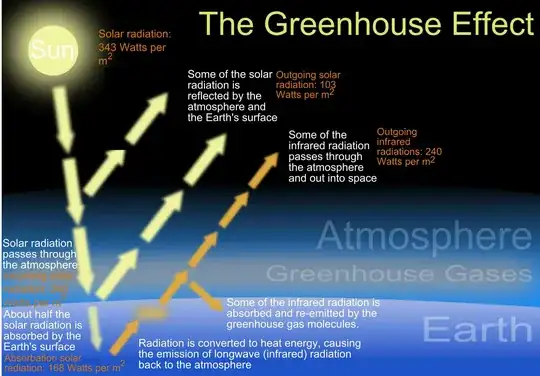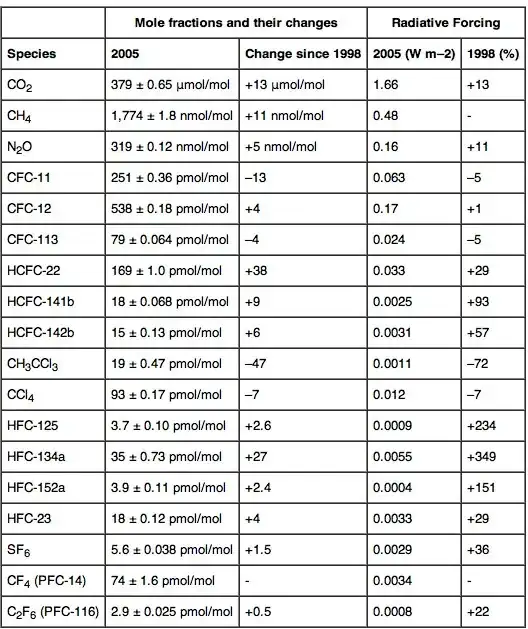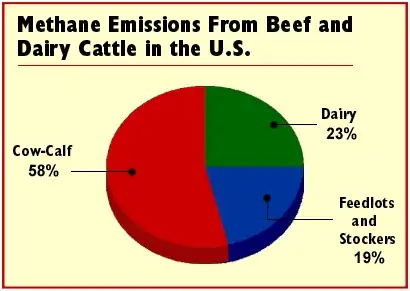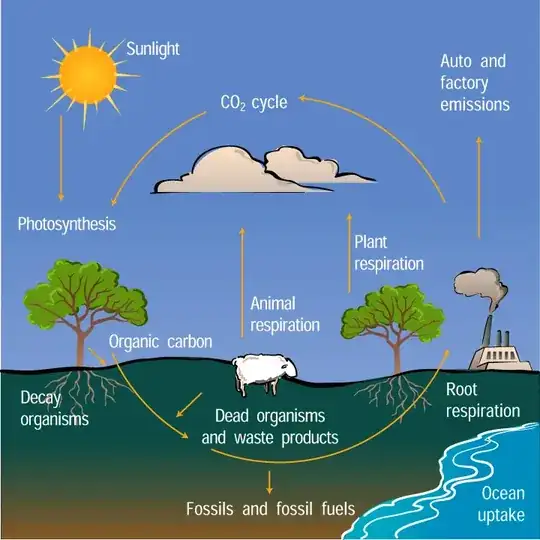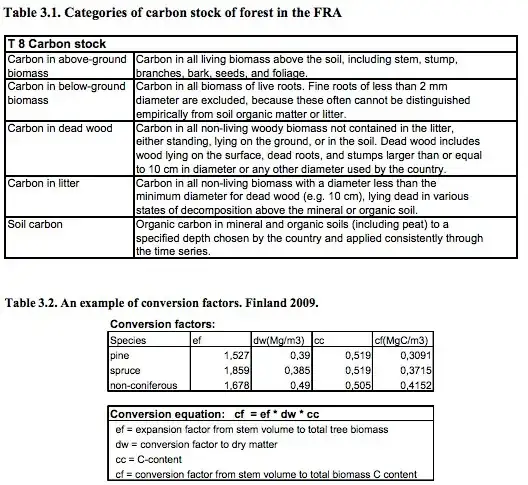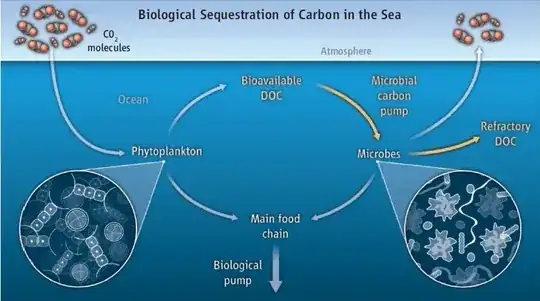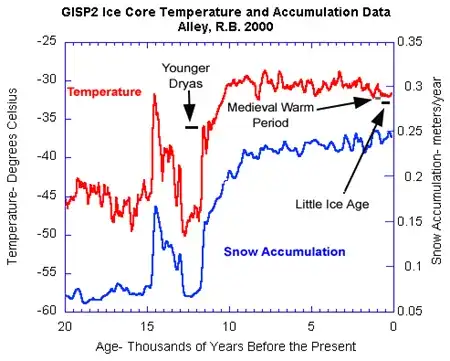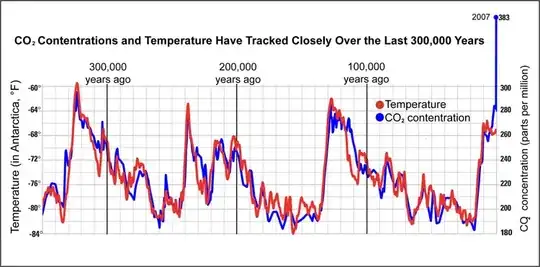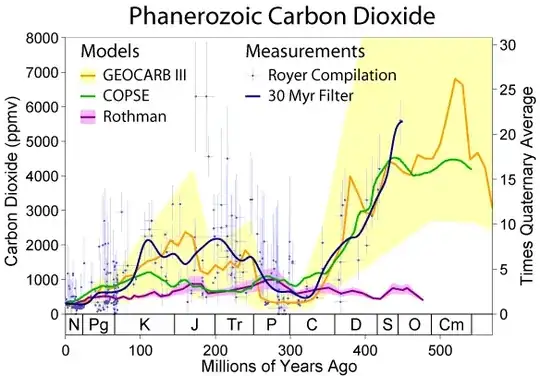There is lots of evidence that I have seen showing correlation between human activities and climate change but what evidence is there to support causation?
-
36This question is ingenuous enough that I have to ask what research you actually did before asking. – David Gerard Feb 25 '11 at 00:39
-
4@David I have done no more research than what is on the TV / newspaper websites / what is taught at school. – david4dev Feb 25 '11 at 00:50
-
2Would that I could give this question more than +1. This is what I *really* want to know. – mootinator Feb 25 '11 at 05:11
-
3Do not be afraid, others will vote, as this is one of the hottest questions nowadays. Be prepared to lengthy, sometimes disorganized and emotional (probably on both sides) discussion. – Suma Feb 25 '11 at 13:02
-
6@Suma What do you mean by “correlation was not proved sufficiently”? The current trend is obvious: Temperature is rising, man-made greenhouse gases (CO2) are rapidly rising. There are hard numbers for both. Historical records could show that this correlation is not causation. But the correlation is there in plain eyesight. – Konrad Rudolph Mar 07 '11 at 22:11
-
1You are right, I was mistaken. Correlation is proved and even people doubting the causation are not disputing this. I am deleting the comment. – Suma Mar 08 '11 at 07:50
-
16Correlation is itself evidentiary *support* for causation, but certainly not proof of causation, but it's only indirect evidence. However, there is massive, overwhelming direct evidence of AGW, which is why 975 of climate scientists and 100% of reputable science organizations accept AGW. – Jim Balter Mar 16 '11 at 13:28
-
1Arguments for causation obviously rely heavily on theoretical climate science. Anyone interested in this area should check out the [cliamte change](http://area51.stackexchange.com/proposals/31977/climate-change) and [geoscience](http://area51.stackexchange.com/proposals/36296/geoscience) area 51 proposals. – naught101 Nov 05 '12 at 05:50
-
im only aware of the claim that humans are causing climate change with CO2 emissions. I got that from Al Gore and the IPCC. Are you aware of other ways humans are causing climate change? – 497362 Apr 30 '14 at 15:14
-
@Wandera Read my linked articles. – Waterseas Apr 30 '14 at 15:15
-
1@wandera Regarding other ways... see [this answer](http://skeptics.stackexchange.com/a/480/5582) – Apr 30 '14 at 15:16
-
One could say Yes, but the effect per human is very tiny... – tuskiomi May 25 '17 at 20:58
-
Predicted in [1958](https://www.youtube.com/watch?v=qF9WdV8pUPk). – Daniel R Hicks Mar 14 '18 at 22:16
-
1@DanielRHicks It actually goes back to Svante Arrhenius in 1896 https://en.wikipedia.org/wiki/Svante_Arrhenius#Greenhouse_effect We've refined his models since, but he was the first to identify the relevant physics, write down equations and plug some measurements in to make a prediction. The relationship between CO2 and temperature since then has been broadly in line with his predictions. In science, successful prediction is generally considered strong evidence that a theory is correct. – Paul Johnson Jun 06 '19 at 14:42
-
1@tuskiomi - Did I stab the man? Yes, but with a very tiny knife, and he was similarly stabbed by 10,000 other people. Therefore I'm not guilty -- his death is not my fault. – Daniel R Hicks Jun 06 '19 at 16:55
7 Answers
Humans affect the weather in mainly the following ways:
Direct emissions of various gasses
Typically CO2 is considered, but also other greenhouse gasses. The greenhouse effect of carbon dioxide was first measured in 1859.
In the 19th century, scientists realized that gases in the atmosphere cause a "greenhouse effect" which affects the planet's temperature. These scientists were interested chiefly in the possibility that a lower level of carbon dioxide gas might explain the ice ages of the distant past. At the turn of the century, Svante Arrhenius calculated that emissions from human industry might someday bring a global warming. Other scientists dismissed his idea as faulty. In 1938, G.S. Callendar argued that the level of carbon dioxide was climbing and raising global temperature, but most scientists found his arguments implausible. It was almost by chance that a few researchers in the 1950s discovered that global warming truly was possible. In the early 1960s, C.D. Keeling measured the level of carbon dioxide in the atmosphere: it was rising fast. Researchers began to take an interest, struggling to understand how the level of carbon dioxide had changed in the past, and how the level was influenced by chemical and biological forces. They found that the gas plays a crucial role in climate change, so that the rising level could gravely affect our future.
—The Carbon Dioxide Greenhouse Effect
Farming
Another man-made source is the direct emission of greenhouse gasses through farming (funny, but true!): manure (and cows) produce methane which is a pretty effective greenhouse gas.
Increasing atmospheric concentrations of methane have led scientists to examine its sources of origin. Ruminant livestock can produce 250 to 500 L of methane per day. This level of production results in estimates of the contribution by cattle to global warming that may occur in the next 50 to 100 yr to be a little less than 2%.
—Methane emissions from cattle
Deforestation
Plants "fix" carbon (a phenomena called "Carbon sequestration"), the less plants, the less fixing (and the more carbon released by fires).
—Carbon sequestration: Forest and soil, by Jukka Muukkonen, Statistics Finland
The Oceans
Changes to the biological equilibrium of the oceans affect the climate because marine biology is known to have a large carbon-fixating effect
One of the most promising places to sequester carbon is in the oceans, which currently take up a third of the carbon emitted by human activity, roughly two billion metric tons each year.
—Carbon Sequestration in the Ocean
Conclusion
All four of these effect can be shown in a laboratory and no model is required to do so, but we have very very good models to explain the lab experiments.
Differently from the lab, the whole climate system is much less understood. And, yes, the model are not as reliable as we would like.
However — due to our knowledge of chemistry — it is undeniable that we are affecting climate. Note that nobody has asserted that human intervention is the only cause of climate change, but it can be said, with a straight face, that humans are changing climate. A very simple example, the rise in temperature melts ice at the pole - which is not only responsible for reflecting some light out of the atmosphere, but also contains methane, which is then released.
The debate can only be on "how much" and "how well can we reverse the trend (even beyond our contribution)".
-
1"Plants "fix" carbon, the less plants, the less fixing (and the more carbon released by fires)" My understanding is that as wood rots it also releases CO2, so fire is not necessary. – John Lyon May 17 '11 at 04:31
-
3@jozzas: that is indeed the case. this is the real dangers of threshold events: we may calculate that by certain amount of CO2 emission, we'll only raise the mean temperature by such and such, but there are milestones along the way, such as the temperature at which the tundra will melt, which will cause massive emissions on its own, by rotting the peat that has been constantly frozen. – David Hedlund May 26 '11 at 08:05
-
3I would add: [Activities which change the albedo](http://stephenschneider.stanford.edu/Climate/Climate_Science/PrincipalHumanActivities.html) of the Earth or atmosphere. – Craig Stuntz Jun 14 '11 at 12:30
-
13We have been doing thing some of those thing for centuries. Nothing in that is evidence that the human contribution is more that negligible. – Guillaume Coté Apr 10 '12 at 14:54
-
8@guill I agree that my answer doesn't prove that, but keep in mind that there's also a lot of evidence that the contribution is not negligible. I chose to focus on the question and avoid bringing up points which may feed unconstructive discussion. – Sklivvz Apr 10 '12 at 17:21
-
9You should call it ranching, or animal husbandry, not farming. If you are going to count cows as a direct effect, you need to count the plants that we grow as a direct negative effect as well. – user1873 May 05 '12 at 23:50
-
2The solar radiation flux mentioned in the first figure of 343 W/m^2 seems wrong. It is [more like 1100 W/m^2](http://en.wikipedia.org/wiki/Sunlight). – Sjoerd C. de Vries May 31 '14 at 09:57
-
1Regarding wood rot and CO2 release - almost all the carbon atoms (99.99% or so) in wood comes from the atmosphere. So unless the wood completely disappears/vaporizes, on average plants sequester more carbon than they release. – slebetman Dec 22 '14 at 08:56
-
@slebetman They do not "disappear", they are processed by micro-organisms into methane, burnt, eaten by mammals (which will produce methane also)... In the end almost nothing remains. – Quentin Nov 12 '15 at 09:42
-
2@Quentin: But those organisms themselves acquire the carbon to form their proteins, fats etc. from plant matter. So unless the organisms also disappear completely then on average the entire process sequester more carbon than released. Note that neither plant matter nor microbes are completely degraded. Most of plant matter (especially the tough cellulose) don't get processed at all. Even if the plant matter is burnt, the residual ash will be effectively sequestered since it will not be processed by organisms nor burn. – slebetman Nov 12 '15 at 13:14
-
1This answer might be improved by noting that we have observed greenhouse gasses apply on a planetary scale, as in with Venus (indeed, it was the Mariner missions that illuminated the greenhouse effects of CO2). – Brian M. Hunt Jan 03 '17 at 12:17
Yes, humans cause climate change (each doubling of CO2 causes about 1C increase). It's really a meaningless question. Any input to any chaos system will cause some effect on that system. Do we know what effect we are having? Can we measure/predict it? Do we have any idea how to alter/change/control that change? And really, what the hubbub is about is not "will the climate change", but "will it change in a really bad way" (ie, catastrophic global warming)
According to Peter Stott models failed to predict current temperatures (though he echoes the recurring claim that they'll be correct in the future), which means that no existing model has predicted, correctly, any significant amount of future climate change, and new research is steadily revealing flaws in existing catastrophic prediction models, so the answer to those questions should be no.
A model which has yet to make an accurate prediction cannot be said to be an accurate model. Therefore, we don't know what effect we're having, we can't predict it, and as a result of those two, we do not know how to alter or control that affect.
Causation on a chaos system is nigh impossible to prove with our current abilities, so we rely on modeling. Unfortunately, instead of insisting that a model make a prediction and have it come true before accepting it, we accept models as true if they accurately predict past events (not kidding), which is trivially easy.
- 12,872
- 1
- 64
- 86
-
Can you please explain why you think climate (as opposed to weather) is a chaotic system? – Oddthinking Feb 25 '11 at 05:48
-
2@Odd -- A chaotic system is one for which small changes to input values cause large and hard to predict changes in output values, or said another way, systems that are highly sensitive to small changes. An example of known small changes that affect climate would be sunspots, CO2, ozone, atmospheric dust... – Russell Steen Feb 25 '11 at 05:57
-
9I understand what a chaotic system is (and I concede that tomorrow's maximum temperature is based on one) but we are debating average temperatures over years, which may be predictable even from an underlying chaotic system. I can't predict heads or tails from one coin flip, but I can from 10,000. – Oddthinking Feb 25 '11 at 06:00
-
6I agree that it may be predictable. Anything is possible. But so far no one has succeeded at it. I'm waiting for the first citation to a model which has successfully predicted a future climate change. -- I provided examples of known factors of high sensitivity to small changes. – Russell Steen Feb 25 '11 at 06:03
-
1"but we are debating average temperatures over years" Only we aren't. Climate is a lot more than just temperatures. – pyvi Feb 25 '11 at 06:40
-
-
-
I deleted that previous comment because its assessment was too harsh. But why spoil your post with that kind of thing? – Uticensis Mar 07 '11 at 19:45
-
@Billare -- Thank you for the correction, last sentence removed. I see your point. – Russell Steen Mar 07 '11 at 19:48
-
14Now *I* don’t like the current last sentence.Because it heavily implies that predictions can only be valid if applied to future events (and even ridicules this). Which is false, an shows a gross misunderstanding of science. Predicting past events is *absolutely fine*. Many scientific theories started out this way. Once again, look at evolution. Only quite recently have we successfully predicted future observations using it, and it was accepted as true (and justly so) long before that. – Konrad Rudolph Mar 08 '11 at 07:40
-
4How I understand the sentence: if you want to test the model, you need to try to model something which you did not use when constructing the model. If you build the model using all historical data, it is trivially easy for that to model to "predict" all that historical data. Only once you compare the results of the model with some data which were not used to build the model, you can tell something about whether the model is working or not. – Suma Mar 08 '11 at 07:54
-
@Russell Steen: How can you claim that humans **cause** climate change when the climate was changing long before humans existed? – oosterwal Mar 11 '11 at 04:05
-
2@oosterwal -- I may have miscommunicated my point. My point is that it's extremely unlikely that we have *NO* affect on the climate, but also unlikely that we are anywhere near as certain as to the magnitude (or even sign) of that affect as the IPCC claims. – Russell Steen Mar 11 '11 at 18:46
-
I want to dispute the assertion that no model has correctly predicted future climate change. In fact, in what was the first global warming paper written 35 years ago, the author predicted a change in global temperature over the next 25 years of +0.8C that was very nearly correct (the actual rise was +0.7C). See [this post](http://www.realclimate.org/index.php/archives/2010/07/happy-35th-birthday-global-warming/) on RealClimate.org. – anthony137 Mar 11 '11 at 19:55
-
1@Russell Steen: Thank you for your update. I agree with that assessment. – oosterwal Mar 11 '11 at 20:17
-
12According to that we should have also seen a 1.1C increase by 2010, and a .58 increase as of 1990. His prediction was off by .2C in 1990 (almost 50% of his projected increase) and .5C in 2010, warming only about half what he predicted. I'm sorry, but making 35 years of predictions and being right one year isn't very good prediction. – Russell Steen Mar 11 '11 at 20:20
-
4@Russell Steen I'm not certain where you're getting your figures. From the graph presented, it looks like his prediction of a 0.58C increase as of 1990 is not more than 0.1C off and his prediction for 2010 is not more than 0.3C off. And of course, I would expect his prediction to deviate more and more from measurement the further he projected into the future. – anthony137 Mar 11 '11 at 20:53
-
-
Meaningless question? Seriously? Also, as you say, because we have to rely on modeling, we really don't know. For example, http://www.skeptic.com/reading_room/a-climate-of-belief/ – Billy ONeal Apr 05 '11 at 03:04
-
-
@Sklivvz -- Delete away, as is your want. I notice there's no matching reference request on the answer below by luis pedro which agrees with your viewpoint. – Russell Steen Apr 09 '12 at 02:01
-
@RussellSteen (The luis pedro answer already had a notice, and it's now deleted). Are you sure you want this deleted? You could reference it if you wanted... Also... you don't know my viewpoint! :-) – Sklivvz Apr 09 '12 at 09:52
-
1
-
7It isn't true that models have never predicted climate change. The first generation of GCMs were made in the early 1970s, at a time when there had been no substantial warming since the 1940s, and so they were rather going out on a limb in predicting warming would take place (which it did). Expecting this first generation of very simple models to get the answer exactly right is unreasonable, the fact is they predicted warming at a time when there was no reason to think there would be warming other than CO2 emissions. – Nov 08 '13 at 10:11
-
4Many Journalists predicted that global warming peaked in 1998. The climate models predicted that, although 1998 was a very hot year due to El Nino, temperatures would indeed continue to rise. The last few years have shot well past 1998, setting record after record in temperature. See the graph at: https://en.wikipedia.org/wiki/Instrumental_temperature_record – gmatht Mar 25 '17 at 14:40
I can’t answer the question directly.
However, there has been at least one large-scale review on the scientific consensus. And it can safely be said that the scientific consensus is overwhelmingly that the current trend in global warming is caused by mankind. It would be weird if this consensus came to be without good evidence.
The review did a literature mining for peer-reviewed literature published between 1993 and 2003 with the words “global climate change” in their abstracts. They found 928 abstracts. Of those, 75% explicitly or implicitly endorsed AGW. 0% rejected it. 25% did not take a position.
As Russell has noted in the comment, these also include mitigation proposals which shouldn’t be counted towards the consensus (since they merely refer to other papers) but were. Furthermore, the review only used one key phrase for their search, excluding parts of the available literature.
So the review contains one systematic error (inclusion of mitigation proposals) and one unsystematic error. Nevertheless, because of the large number of papers it is still safe to assume that these will not change the reported consensus significantly.
Note that this does not mean that there are no dissenting opinions in the scientific community – there are – merely that the overwhelming majority of experts accepts AGW and that they probably have good reasons to do so.
(Still, this “answer’ is more of an FYI than an actual answer since, I want to stress again, it does not provide any of the evidence asked for.)
- 12,427
- 3
- 56
- 84
-
-
@Borror0 I agree but it’s much too large for a comment, and I think it should be placed more prominently, in particular because it contains a reference to a review that has collected *a lot* of data. – Konrad Rudolph Mar 07 '11 at 22:16
-
12The large scale review you link is very skewed. For instance, they include mitigation proposals as supporting papers. So if one paper demonstrates a cause, and five papers use that paper as a reference for which to show mitigation, it would be counted six times. Also the study only included 1993 to 2003. They only showed papers using the words "climate change", instead of doing a thorough analysis. It looks, all in all, like someone just googled a journals database, with a specific goal in mind, as noted by the fact that anything that didn't specifically counter AGW was counted as support – Russell Steen Mar 07 '11 at 22:26
-
All that being said, it is a good reference, an thank you for providing it. It provides more information on the subject. – Russell Steen Mar 07 '11 at 22:26
-
So now two people have independently said that this is a “good reference” / “awesome comment” but it still has a total vote count of –1, and no explanation. How come?! – Konrad Rudolph Mar 08 '11 at 07:41
-
@Russell Some good points, I’ve updated the answer. But your characterization of the counting isn’t quite correct. In fact, they did *not* count everything that didn’t counter AGW as support (25% neutral), and tellingly, they found not a single paper that actually opposed AGW (although these *do* exist). So while agree that there are at least two different errors in the review I don’t agree that everything that didn’t mention AGW was counted as support. Furthermore, this kind of keyword based literature search is well established and quite exhaustive (although more keywords would be nice). – Konrad Rudolph Mar 08 '11 at 08:02
-
@Russell (damn these short comments) Furthermore, the “specific goal in mind” that you mentioned was, according to the review, the hypothesis that “[the official climate reports] might downplay legitimate dissenting opinions”. In other words, their null hypothesis was “AGW does not have a broad consensus in science” and they failed to find any support for this, rejecting the null hypothesis. This is standard procedure and in principle good science. – Konrad Rudolph Mar 08 '11 at 08:06
-
6there's no "concensus", and even if there were "concensus" isn't scientific evidence. There was concensus that the sun revolved around the earth in the time of Galileo, we all know different now. There was concensus that life began about 6000 years ago in the time of Darwin. There was concensus that dinosaur bones were the bones of giants and heroes in ancient Greece. – jwenting Mar 08 '11 at 08:43
-
14@jwenting “there is no ‘consensus’” – well, I have cited sources that show the opposite. What are your sources? As it stands, your statement is ridiculous. || “even if there were ‘concensus’ isn't scientific evidence” – exactly, that’s what I also said in the answer. The other consensuses you cite rely on ignorance rather than data and don’t pertain to the discussion. – Konrad Rudolph Mar 08 '11 at 08:54
-
18@jwenting There is a consensus; the claim to the contrary is a lie. And consensus is the *consequence* of there being scientific evidence -- in this case, overwhelming scientific evidence. Against this consensus, you have ... nothing. Your analogies are irrelevant -- this consensus is among *climate scientists*, whereas the consensus against Galileo was among people who had never looked through a telescope. – Jim Balter Mar 16 '11 at 13:43
-
1@KonradRudolph: consensus means unanimity, and clearly there is no unanimity. "Overwhelming consensus" is just newspeak. There is no such thing as overwhelming unanimity, you either have unanimity or you don't. – vartec Jun 26 '12 at 08:58
-
13@vartec “consensus”, according to the dictionary and common usage, means “general agreement”. “unanimity” means “ *absolute* agreement”. They may be used synonymously, or they may denote different degrees of agreement. “Overwhelming consensus” is *not* newspeak – and I resent the accusation. I used it to make it clear that there is more than “just” *general* agreement, i.e. that the agreement is almost unanimous. There is nothing “newspeak” about this, it’s a normal juxtaposition of words to intensify a meaning. – Konrad Rudolph Jun 26 '12 at 09:19
-
-
@cyril To global warming? 0%. The effect is completely negligible. Also, completely unrelated to asthma. Rather, you’re probably suffering from second-hand smoke. – Konrad Rudolph Dec 08 '13 at 16:50
-
totally yes, I feel really endangered by smokers, and thought it could affect environment at a small scale. but that's a personal suffer – caub Dec 08 '13 at 17:05
-
2@JimBalter Consensus science has a bad historical track record. For example, the consensus of scientists used to be the different species were directly created by God, the sun revolved around the earth, and light travelled through ether. Why is consensus especially reliable when it comes to climate change? – yters Jan 03 '17 at 16:19
-
the problem with "consensus is overwhelmingly" is not percentage, but the voters personal interest. If it would be proved that global warming is a fake and that human contribution is zero - how fast the government will kill all climate research programs and grants as of no importance? And how fast climatologists will loose their jobs? So why they should vote different? – Bogdan Aug 09 '18 at 10:35
Trends in solar radiation don't match up with trends in temperature. One of the arguments from skeptics of climate change is that rising global temperatures are a natural phenomenon caused by the Sun. However, most measures of total solar irradiance (also known as solar radiation, the electromagnetic energy incident on Earth's surface) show that, on the whole, it is falling. (This, of course, necessitates taking a step back to see larger TSI trends, beyond the valleys and peaks caused by the solar cycle.)
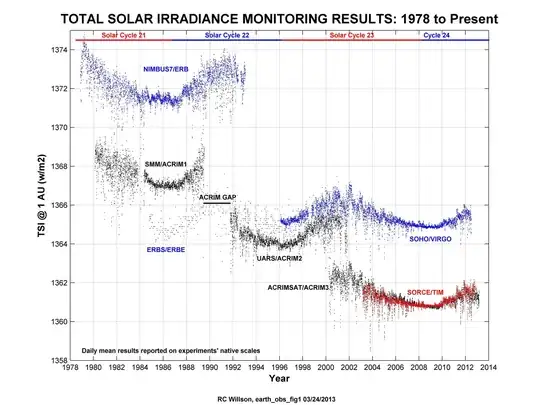
In short, it looks like the Sun is actually cooling. Not dramatically, but it's certainly not becoming hotter, and certainly not enough to account for rising global temperatures. In fact, when we juxtapose climate temperature with solar irradiance, as shown below, we find that they have little to do with one another. This is a basic, common sense approach, but if you require mathematical proof, then Skeptical Science has put together a digestible calculation and analysis. Anyhow, just a graph:
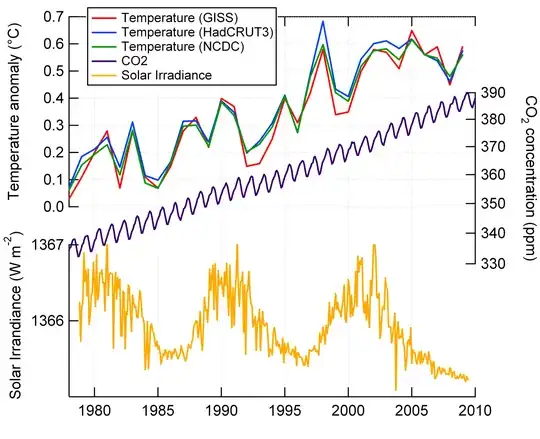
So you may not agree that global warming is anthropogenic. But as scientists look at solar irradiance as just one piece of evidence that correlates with various others that fellow commenters have left, it's becoming increasingly clear that it's not caused by the Sun. What does that leave?
- 409
- 4
- 5
-
5Welcome to Skeptics. This answer demolishes one alternative hypothesis to anthropogenic climate change, but that isn't enough to demonstrate it *is* anthropogenic. – Oddthinking Nov 07 '13 at 23:29
-
14As Hume argued, it is impossible to gain certain knowledge of causation through empirical means (as we can only directly observe correlation, not causation). This means science essentially boils down to a search for the best explanation, and the way that is done is by first showing the alternative explanations are flawed, and then argue that amongst the hypotheses that remain one has better support from theory. This is not the kind of question that can be given a definitive answer based purely on observations. – Nov 08 '13 at 10:06
-
6At this stage (there already being a good answer higher up) it seems more useful to demolish the alternatives, rather than to have another go at answering the question completely, which would just end up with a great deal of repetition. Just my opinion, of course. – Nov 08 '13 at 10:18
-
3Why look at only the last 35 years or so? Your link to "Historical Total Solar Irradiance" http://lasp.colorado.edu/lisird/tsi/historical_tsi.html from year 1600 until now to me seems to explain a lot more of the temperature changes. – tomsv Dec 29 '13 at 14:27
-
What about the low cloud cover and its influence? https://arxiv.org/pdf/1907.00165.pdf – Jagger Aug 02 '19 at 14:36
The IPCC report gives the following probabilities:
The total radiative forcing of the Earth’s climate due to increases in the concentrations of the LLGHGs CO2, CH4 and N2O, and very likely the rate of increase in the total forcing due to these gases over the period since 1750
What do they mean when they say very likely? They mean 0.95 < p < 0.99. When someone says that the evidence for climate change is comparable to the evidence for evolution they are either advocating that the IPCC is wrong by orders of magnitude or they are gravely insulting academic biology.
255 members of the US National Academy of Sciences including 11 Nobel Price winners issued a letter that claims:
For instance, there is compelling scientific evidence that our planet is about 4.5bn years old (the theory of the origin of Earth), that our universe was born from a single event about 14bn years ago (the Big Bang theory), and that today's organisms evolved from ones living in the past (the theory of evolution). Even as these are overwhelmingly accepted by the scientific community, fame still awaits anyone who could show these theories to be wrong. Climate change now falls into this category.
In an attempt to defend orthodox wisdom mainstream scientists seem to be willing to pretend that the evidence is for climate change is a lot better than it actually is.
Other people who see themselves in defense of climate change think that the IPCC is a bit overconfident.
There are a lot of reasons why that might be the case:
- Humans typically suffer from confirmation bias. Even a friendly reading of the climate gate emails that Wikileaks published suggest that they don't engage in mental strategies to reduce their vulnerability to confirmation bias.
- The computer code that they use to generate the models has low standards. It has probably a lot of bugs that throw extra inaccuracy into the models that aren't accounted for.
- Some data isn't openly available to allow for independent verification.
- We have seen in the financial crisis that complex computer models often include a lot of assumptions that make them overconfident.
- Climate scientists test their models on past data and generally don't make predictions about the future to test their models. As the models have a lot of parameters that makes the models to appear better than they are.
That doesn't mean that we should assume p=0 but it might be reasonable to use a lower likelihood value than the IPCC value. If we go from 0.95 < p < 0.99 to 0.80 < p < 0.90 we have more than a 10% chance of being wrong. Even if we just go to 0.90 < p < 0.95 we have more than a 5% chance of being wrong.
Why does that matter? Isn't p=0.80 enough for starting to reduce CO2 emissions? That might be true. If we, however, start geoengineering, the confidence in our models matters a great deal. Starting geoengineering on the assumptions that our models are magnitudes better than they really are is dangerous.
Part of being a good skeptic should be to avoid being more confident in your beliefs than the data warrants. We should move past binary classification. Instead of showing tribal loyalty we should call out our friends when they overstate the evidence.
-
4Some datasets are not available publicly, but there is still [a lot of data that is available for independent verification](http://www.realclimate.org/index.php/data-sources/). – Mad Scientist Mar 08 '11 at 13:44
-
@Fabian: Okay, I changed the statement to saying from "the data" to "some data". – Christian Mar 08 '11 at 14:36
-
7I don’t understand your allegation in connection with evolution. (1) who is claiming that there is comparable evidence for both? (2) why would this mean the IPCC were wrong by an order of magnitude? Magnitude of *what*? The p-value? The confidence? – Konrad Rudolph Mar 08 '11 at 19:02
-
(1) The quoted paragraph. I provided a link. Saying that two theory are in the same class of evidence suggests that both have an equal chance of being true. (2) According to the IPCC this climate change claim has a likelihood of being true that's under 0.99. I think we can agree that the likelihood for evolution being true should be over 0.99999999. – Christian Mar 08 '11 at 19:53
-
3The comparison of economic models to models in any physical science is laughable. Also, if you have ever read **any** scientific code, you will know that it is almost uniformly of poor coding standard (computer science may be an exception here). Note that [coding standards](http://en.wikipedia.org/wiki/Coding_standard) refers only to stylistic conventions, which certainly improve maintainability, but are totally independent from whether the code works as intended or not. The link you provide is mostly specious remarks, with little or no actual criticism of code functionality or quality. – naught101 Nov 05 '12 at 06:05
-
It is not actually true that the models are not tested by making projections of future climate. The IPCC reports have been supported by a number of model inter-comparison projects (CMIP5 being the most recent) that do *exactly* that. The modellers make their projections publicly available, so anyone can find out what they say ClimateExplorer is a good portal for accessing them, which I use. Of course observations of the future are not currently available, so papers written today can only compare todays models with the past and previous generations of models with todays climate. – Nov 08 '13 at 10:49
-
1As to code quality, I suspect that this comment is based on analysis of one program (which isn't actually a model - CRUs research interests lie more in observational datasets). The code for the NASA GISS model has been in the public domain for a long time and have there been any adverse comments on code quality? Also the panel that conducted the review of the science performed by CRU were able to replicate the analysis for themselves in only a couple of days, so the comment on code quality doesn't mean the program didn't work correctly or that the science was flawed. – Nov 08 '13 at 10:59
-
2as to "some data isn't openly available to allow for independent verification." this is a spurious argument as if you rebuild the analyses using only the publicly available data (of which there is a considerable amount) you get essentially the same result. It is not the scientists fault that national meterological offices are required to make a profit and don't give away their data, the scientists have to operate within the law. Skepticism is good, but we also need to be skeptical of the skeptics. – Nov 08 '13 at 11:04
-
1@DikranMarsupial : Scientists who write a oped in Nature about climate change policy implications and don't use it to call for the opening of data by national meterological offices are at fault. | When reading out CMIP5 (http://cisl.ucar.edu/dir/CAS2K11/Presentations/meehl/Meehl.CMIP5.Annecy.pdf) they frequently say words like hindcast. Hindcasts are no real experiments. Could you point me to real experiments with short time scales that aren't hindcasts? – Christian Nov 08 '13 at 11:26
-
2Christian, the scientists *have* been working to make more of the data available and indeed more of it has been made available. However it doesn't actually change the conclusions, so it is a bit of a red-herring. Of course model inter-comparison projects also involve hindcasts, for the simple reason that observations of the future climate are not available at the current time. However they do make predictions that can be tested when the observations are available. If you want experiments on short timescales, look at the papers that predicted the climate response to Pinatubo. – Nov 08 '13 at 11:46
-
However, when you loot at *short* timescales you are effectively trying to predict ENSO rather than any long term climate trends, so it is not very informative when judging the effect of increasing greenhouse gas emissions. The effects of ENSO are cyclic and average out over the course of 30 years or so (which is why climatologists tend to study climate on that timescale). – Nov 08 '13 at 11:48
-
Note some surface temperature datasets (such as GISTEMP) use only publicaly available data, so if data availability is a cause for skepticism, use GISTEMP rather than HADCRUT4 (it gives pretty much the same result though). – Nov 08 '13 at 11:50
-
Apparently the station data for the latest CRU dataset are also now publicaly available http://www.cru.uea.ac.uk/data-availability . – Nov 08 '13 at 12:00
-
1@DikranMarsupial : (1) Whether or not it's hard to do predict something without hindsights doesn't matter. As far as science goes hindsight experiments don't provide the same evidence as real experiments. When discussing standards of evidence "fairness" plays no role. Standards are objective and don't care. (2) You can probably control models for effects of ENSO to get more relevant predictions. (3) If you lost your carkeys in the dark you argue that finding carkey in the light is much easier. – Christian Nov 08 '13 at 12:07
-
1Christian, I am not saying it is hard, I am saying it is impossible. We don't have a time machine, so the only data we can use to test the **latest generation** of models with is data from the past. They do however make predictions of the future, which can then be analysed later. This is routinely done, the results clearly depicted in the IPCC reports. If you "control for ENSO" on the observations, you get more or less a straight line with a bit of noise on it (http://iopscience.iop.org/1748-9326/6/4/044022), which is in good agreement with the models from previous CMIP exercises. – Nov 08 '13 at 12:23
-
1@DikranMarsupial : (1) The fact that climate scientists don't separate between impossible and not being smart enough to think up a way, doesn't encourage trust in their models. (2) If it's nearly a straight line you should be able to predict the noise of that line for the next 3 years easily. If you do that for the future as opposed of for the past in hindsight, that would increase my trust in the ability of climate scientists. – Christian Nov 08 '13 at 13:14
-
2(1) O.K. say I have just finished putting the final touches to my new climate model. Please explain how I can test it at this point without using data from the past. – Nov 08 '13 at 13:19
-
1@DikranMarsupial : You make predictions for the future and wait a few years. If you want to get a new drug approved that's how you do it. Nobody would approve a drug based on analysis of past data. – Christian Nov 08 '13 at 13:38
-
3Christian, that is exactly what the model inter-comparison projects have done. They analysed hindcasts as well, but they also archived projections made by all of the principal modelling groups for future analysis and analysed results from previous CMIPs - the results are presented in the IPCC reports and elsewhere. Here is the results of a model-observation comparison for the CMIP3 exercise provided by RealClimate, for example http://www.realclimate.org/images/model122.jpg . – Nov 08 '13 at 13:44
-
1@DikranMarsupial : If I read that chart right it doesn't show that the model is any better at forcasting than the trival model of temperature stays roughly the same. It doesn't seem like a good argument to me for thinking the model has high predictive value. – Christian Nov 08 '13 at 14:12
-
6Christian, sorry this is becoming tiresome. You first claimed that climatologists do not generally compare model projections with future climate. I have shown that this is clearly not the case, but rather than admit your error, you are deflecting the discussion onto whether those models show skill. This is not how genuine scientific discussion should proceed, as errors should be freely acknowledged. – Nov 08 '13 at 14:22
-
1@DikranMarsupial : No, I claimed that they don't do so in a way that tests their models. If the comparision isn't able to reject the trival model of unchanging temperature, than I don't think we can speak of a real test of the model. If you test a drug in a clinical trial the outcome is a p-value. I would want something like a p-value that validates that your climate models outperform the trival model. – Christian Nov 08 '13 at 14:29
-
2As to what the comparison shows, over such a short time-scale a "temperature stays roughly the same" will always be reasonable due to the chaotic component in the data being large compared to the underlying trend. However that doesn't mean a "temperature stays roughly the same" model would be plausible guide over a centennial scale, where the cyclic chaotic component would average out, but the long term trend would not. You have to know enough about the physics and the statistics to intepret the comparison properly. – Nov 08 '13 at 14:30
-
3It takes 20-30 years for the test to have adequate statistical power, so only the very earliest model projections are old enough to perform this exercise. If you look at e.g. Hansen's early models, you will find that they do indeed outperform the trivial model. For more recent models, there isn't enough observational data yet, but the CMIP archives provide exactly the facilities to perform these tests when they are available. So your claim is incorrect, the modellers are testing their models projections to the extent that it is actually possible without a time machine. – Nov 08 '13 at 14:43
-
1(1)I'm not saying that "temperature stays roughly the same". I'm saying that you test fails to distinguish between that hypothesis and the hypothesis that the climate model is better. (2) Do you have something like a p-value that measures how well Hansen's early models outperform the trival model? (3) You could get added statistical power by predicting temperature difference between measuring stations. It not trival, but you could build a decent model for evaluating forecasts. – Christian Nov 08 '13 at 15:03
-
1(1) as I have pointed out, Hansens 1988 model projections does pass the test. (2) temperatures since 1988 have a statistically significant warming trend (see e.g. SkS trend calculator http://www.skepticalscience.com/trend.php the confidence interval for the GISTEMP trend since 1988 does not contain zero). (3) no, you could not get added statistical power that way, you would be then looking at station data rather than global averaged data, and station data has a higher variance (i.e. more noise). – Nov 08 '13 at 15:17
-
1(1-2) I want to know whether the Hansen model is predictive and how good it is at predicting. I don't want backwards data analysis. – Christian Nov 08 '13 at 16:43
-
(3) You can make 100000 statements about how the station data interacts with each other. "If station2555 data temp>20 degrees at date Y, station2755 data will be temp<22 at date Z". Then do a competition and let 20 teams make model predictions for the likelihood of all 100000 statements being true. Add up the likelihood values for all true statements and subtracts those of all false one. You get a score for a model. The tricky part will be to choose your 100000 predictions with a maximum of degrees of freedom but that should be doable. – Christian Nov 08 '13 at 16:49
-
3Hansens model predictions were made in 1988, so the period 1988 to the present day is not a "backwards data analysis" (I am pretty sure that Prof. Hansen doesn't own a time machine, so the model cannot possibly depend in any way on climate since 1988). Hansen's models over-predicted the warming slightly (climatology has moved on substantially since 1988), but his projections are consistent with the warming trend since 1988, the "no warming" hypothesis is not. – Nov 08 '13 at 16:53
-
2Christian, I think you ought to learn more about how climate models actually work before designing tests of their forecast skill. A GCM does not have the spatial resolution to make projections at station level (the U.K. fits more or less in a grid box). This is why statistical downscaling methods (one of my research interests) are necessary for evaluating local impacts. The test you propose is fundamentally flawed for a number of reasons (*two* of which I have now given you). – Nov 08 '13 at 17:07
-
1@DikranMarsupial : You get things backward. You don't design a test for a model but a model for a test. You basically say that the models are badly designed for evaluating forcasting efficiency. Yes, you would have to change to models to make local predictions. So what. In bioinformatics we have CASP as biyearly contest for protein structure predictions. Nobody gets credit for hindcast protein structure predictions. Maybe 100000 is too much and 1000 data points are better but you can certainly go beyond 1. – Christian Nov 09 '13 at 07:26
-
1@DikranMarsupial : Why do you use vague words such as "consistent"? Don't you have some statistic that puts a number of how consistent the model happens to be? – Christian Nov 09 '13 at 07:28
-
3Christian, "consistent" is not a vague word, it has a specific statistical meaning, which is thoroughly appropriate for a comparison of hypotheses. The SkS trend calculator gives 95% confidence intervals, and the "temperature stays the same" hypothesis is inconsistent at that level. However you are just blustering now to avoid admitting that you were wrong to state that "Climate scientists test their models on past data and generally don't make predictions about the future to test their models.", sadly this sort of evasion is rife in discussion of climate on the WWW. – Nov 09 '13 at 15:53
-
2Secondly, it was you that is designing a test after the models were created, not the climatologists, and I note that you made no attempt whatsoever to address the two flaws I pointed out in your test. I also did not say that the models are badly designed for evaluating forecast efficiency. Misrepresenting someones position like that is deeply unscientific. I shall end the discussion there, there is no point in continuing a scientific discussion with someone willing to stoop to that level. – Nov 09 '13 at 16:00
-
(4) The climatologists failed to create decents test before they made their models. Expect the Hansen models they maily evaluate their data in hindsight or in 30 year timeframes. I'm just illustrating how you could evaluated some climate models with 3 year forcasts. (5) You make two arguements. (A) Station datas have noise. That in no way implies that it's not possible to predict something about them. If you do 100000 forcasts that should average out. (B) Climate models that exist don't do local forcasts. That fiaxable. You can make local forcasts and integrate them into models. – Christian Nov 09 '13 at 18:28
-
1(6) You said that the model aren't equiped to evaluate forcast power within short timeframes. I don't think that's a misrepresentation. (7) I asked you for p values and you haven't given me any or similar statistics but the word consistent. p values are more precise. Are you saying that Hansen's models are within a 95% confidence intervals of accurate temperatures while the temperature doesn't change model isn't within a 95% confidence interval? – Christian Nov 09 '13 at 18:31
-
3Christian, I note you fail to apologise for misrepresenting my position and merely repeat it. I did not say that the models are not equipped to evaluate forecast power within short time frames, the problem is not to do with the models but the observations. For the test to be meaningful, you need observations over a long enough period for the underlying trend to be detectable under the noise. Station data is worse as being noisy they need a longer period for this to be the case than global average data. It is the trend that the models aim to project, not the noise. – Nov 10 '13 at 09:38
-
3The fact that you seem to think the models could be adapted to give local forecasts shows that you have no idea how climate models work. If this were feasible, do you not think that perhaps the modellers might just have done so by now, rather than using statistical downscaling (as I pointed out earlier?). Not being willing to concede you are wrong on a topic where there are clear gaps in your knowledge is hardly skepticism. Perhaps you should consider whether you yourself have been subject to some confirmation bias in your acceptance of the sources given in your answer. – Nov 10 '13 at 09:44
-
1"The climatologists failed to create decents test before they made their models." This is nonsense, the whole purpose of the CMIP exercise is to coordinate the evaluation of models. I've already pointed this out several times, and STILL you are ignoring this. Life is too short to continue discussion with someone who is not listening. – Nov 10 '13 at 09:47
-
Simple explanation of weighing the risks of assuming either: http://3.bp.blogspot.com/-TRZm8_7MaWs/UZUskeyUSqI/AAAAAAAABng/XSvSL1L9doQ/s1600/Chart00.png – Waterseas Apr 30 '14 at 22:11
-
@Waterseas: The graph is full of fallacies, but this comment is too short to include them all. – Oddthinking Nov 12 '15 at 00:56
-
1@Christian: This answer appears (??) to fall for a [common misunderstanding of p-values](http://www.graphpad.com/support/faqid/1317/). It is not appropriate to read p-values (as used for tests of statistical significance) as the probability that the null hypothesis is true. – Oddthinking Nov 12 '15 at 00:59
-
@Oddthinking : The values that the IPCC report gives are probabilities that something is true. It's the likelihood of the event being true. My answer says nothing about testing for statistical significance. If you think it's misleading to call them p-values do you have a preference for how I call them? – Christian Nov 12 '15 at 12:25
-
I understand the ambiguity of "value of p" is confusing (and hence my qualifiers in my comment, in case it is *me* who is confused!) I am glad to hear the IPCC is using probabilities - easier to understand. When you say "If we go from 0.95 < p < 0.99 to 0.80 < p < 0.90 the p value for the climate change claims isn't statistically significant anymore." that seems to be swapping usages to the other meaning. – Oddthinking Nov 12 '15 at 12:32
-
"In an attempt to defend orthodox wisdom mainstream scientists seem to be willing to pretend that the evidence is for climate change is a lot better than it actually is." -- There's no evidence for this. "Saying that two theory are in the same class of evidence suggests that both have an equal chance of being true." -- Unwarranted, tendentious assertion. All the quoted paragraph says is that they are both in a *category* -- and they plainly *are* both in the category described. "think that the IPCC is a bit overconfident." -- that's backwards ... the IPCC is by nature *conservative*. – Jim Balter Jan 03 '17 at 17:54
-
"The fact that climate scientists don't separate between impossible and not being smart enough to think up a way, doesn't encourage trust in their models." -- If you had had any credibility, this would have been enough to destroy it. – Jim Balter Jan 03 '17 at 18:05
There is an overwhelming amount of evidence that, while humans didn't like CAUSE climate change, we are indeed accelerating it. A couple of excellent links of research to explain this are here:
- 424
- 1
- 5
- 13
- 284
- 1
- 7
-
1do those references explain how climate isnt following the rise in atmospheric CO2? – 497362 Apr 30 '14 at 15:00
-
4@wandera See this answer. Temperature *is* following atmospheric CO2: http://skeptics.stackexchange.com/a/18326/5582 – Apr 30 '14 at 15:12
-
1@wandera What you just asked is known as a 'loaded question'. Climate IS following CO2, as Articuno just stated. – Waterseas Apr 30 '14 at 15:14
-
@wandera Also, your source is well known to be a bit of a crack pot, with his business claiming to be able to make accurate forecasts a year ahead of time, and his claims on global warming going against 'widespread scientific consensus that global warming is occurring due to human activity.' http://en.wikipedia.org/wiki/Piers_Corbyn – Waterseas Apr 30 '14 at 15:28
-
I looked up the conference that Corbyn presented his theory in, and it turned out to be a conference on "Electric Universe Theory" (http://rationalwiki.org/wiki/Electric_Universe). That puts Corbyn's work into perspective, even if the tabloid newspaper level slides used in his talk doesn't. – Apr 30 '14 at 17:22
-
@DikranMarsupial I would recommend avoiding using rationalwiki as a source if possible, as they have a high tendency to not use neutral sounding arguments and instead use somewhat inflammatory wording. – Waterseas Apr 30 '14 at 18:27
-
1@Waterseas fair enough, the good thing about the link though is that it contains links to both "supporters" and "dissections". I see this has been discussed at the physics stack exchange http://physics.stackexchange.com/questions/18950/how-to-debunk-the-electric-universe – Apr 30 '14 at 18:39
Yes, humans contribute to climate change, but there is significant disagreement regarding to what degree humans contribute.
Climate change happens, and it has been happening for billions of years. That industrialized human existence is but an insignificant blip on the geological time scale undermines the frequentist views on significance.
To promote convenient views on anthropogenic climate change (ACC), we are often show recentist graphs such as this:
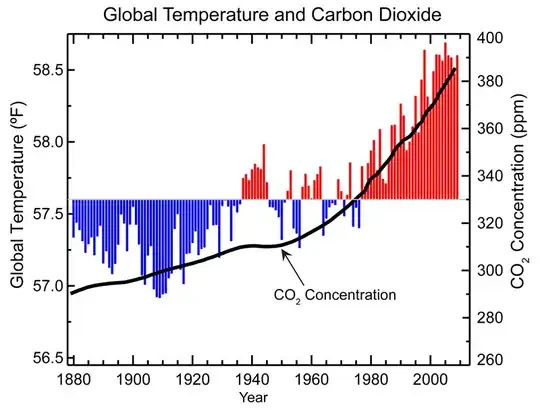
The premise is that correlation implies causation. However, in addition to the greenhouse effect, there are other facile natural mechanisms which help to explain this correlation. These mechanisms are not mutually exclusive but tend to support the idea that temperature causes carbon --- not the reverse.
When you take a step back from the recentist view in order to examine a longer time scale, this relationship between temperature and CO2 weakens. In fact, it indicates that the Earth was warmer even over the most recent Milankovitch cycle. This directly contravenes views that ACC is a result of the human industrial revolution.
But then again, we are often reminded that the correlation is significant over longer periods (if you cherry-pick the data, that is), as evidenced here:
However, this relationship only holds while Milankovitch cycles are relevant. Over even longer geological time periods, the relationship between CO2 and temperature is nil:
So, I think it's important to take all facts into consideration.
Anyway, a more extended version of this argument against "the consensus" argument is found here.
- 140,378
- 46
- 548
- 638
- 107
- 2
-
3You describe one paper as facile, but give no reason why it should be characterised as such. Can you please explain? – Oddthinking Apr 27 '17 at 00:28
-
3The last graph is basically a mirror image of the ones discussed [here](https://skeptics.stackexchange.com/questions/35927/are-we-in-a-low-co2-period-compared-to-the-last-590-million-years/35938#35938) and [here](https://www.skepticalscience.com/co2-higher-in-past-intermediate.htm), where the opposite conclusion is drawn. – Oddthinking Apr 27 '17 at 00:33
-
@Oddthinking. "...in situ warming of the atmosphere does not occur; instead, a store-and-release mechanism from the ocean to the atmosphere is proposed. It is physically plausible and theoretically sound." In-situ warming is predicted by the greenhouse gas theory of ACC. Another facile mechanism is posited such that the oceans provide a store-and-release mechanism. This mechanim is not inconsistent with conjectures that rises in CO2 may be a partial result of rising temperatures. – David Addison Apr 27 '17 at 01:01
-
1@Oddthinking. I don't see any strong opposing conclusions. On both accounts, the authors conclude that there are multiple factors which drive global temperatures. The differences in opinion can summarized as follows: "don't conflict with the consensus" versus my "don't support the consensus". In none of these cases is Phanerzoic CO2 used to "support the consensus". – David Addison Apr 27 '17 at 01:07
-
3If the graph show evidence which you say neither supports nor conflicts with the scientific consensus, is it reasonable to conclude that it is a red herring that doesn't advance the argument in either direction and can be deleted? – Oddthinking Apr 27 '17 at 05:20
-
2"Facile" means "ignoring the true complexities of an issue; superficial". It is fine for you to have an opinion that a particular paper is facile, but (a) you need to show with evidence that it is the case before you include that in an answer, and (b) you introduced this evidence - why? – Oddthinking Apr 27 '17 at 05:22
-
@Oddthinking. It's is simply there to show that other forces must be accountable over the longer (frequentist) time scale... that "the consensus" view, defined here as the ACC/CO2 alarmism crowd, over-simplifies a complex system. Why? Do you think it should be deleted? – David Addison Apr 27 '17 at 05:28
-
@oddthinking. "Facile" in this context means that the causation is easily understood and that the mechanism can be expected to manifest itself easily, under normal conditions. I don't think that it means superficial in this context. – David Addison Apr 27 '17 at 05:35
-
2The consensus view is not "the ACC/CO2 alarmism crowd". It is the IPCC documents. I maintain that a chart that does not conflict with that view is not advancing your argument against the IPCC view, and is hence a red herring. Furthermore, you still haven't demonstrated that one arbitrary study you have chosen is facile or relevant, so it should be removed as a red herring too. – Oddthinking Apr 27 '17 at 05:45
-
@Oddthinking. The question is "Do human activities contribute to climate change?". The answer is categorically, "yes". But there is significant disagreement regarding to what degree humans contribute and what precise weightings and interactions should be given to the underlying variables. Moreover, a very common perception is that the greenhouse effect is the primary mechanism for climate change which then leads to a very logical conclusion: ACC. I believe that demonstrating the long-term (in-)effect of CO2 levels on temperatures provides necessary context for the question. – David Addison Apr 27 '17 at 05:57
-
-
Let us [continue this discussion in chat](http://chat.stackexchange.com/rooms/57801/discussion-between-david-addison-and-oddthinking). – David Addison Apr 27 '17 at 06:04
-
2Some of your graphs use Fahrenheit, and some use Celsius. That bugs me. – daniel Apr 27 '17 at 07:42
